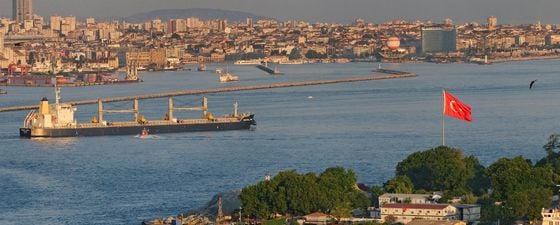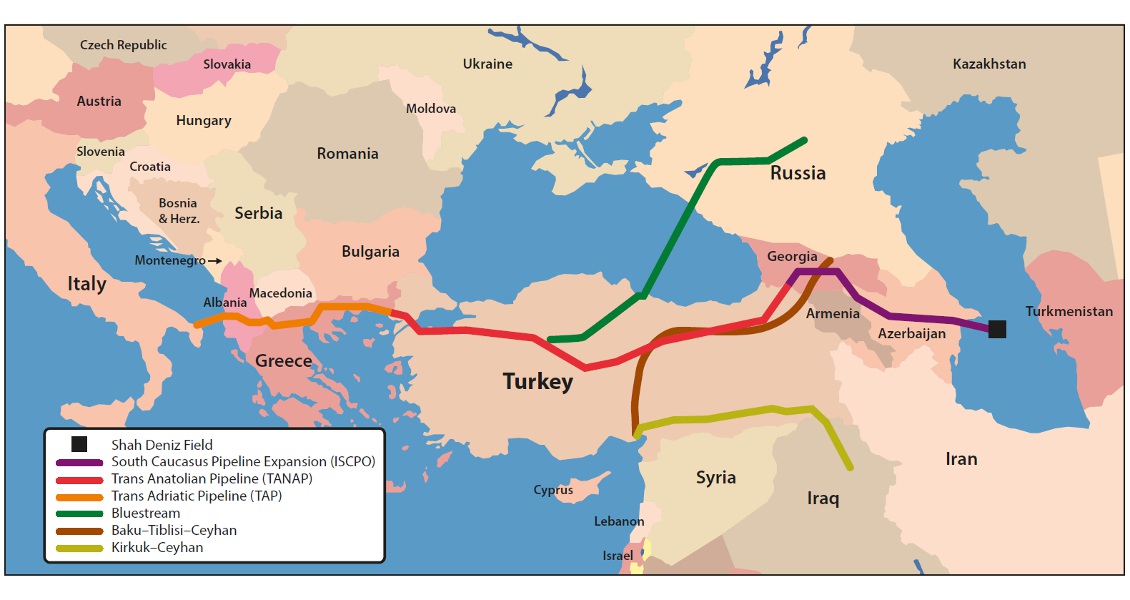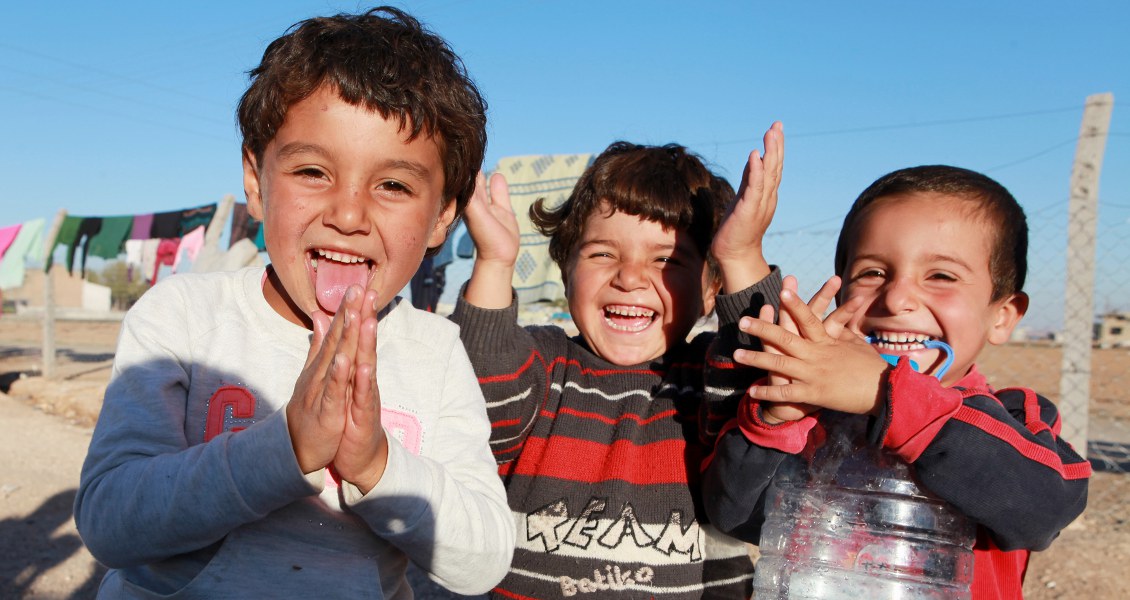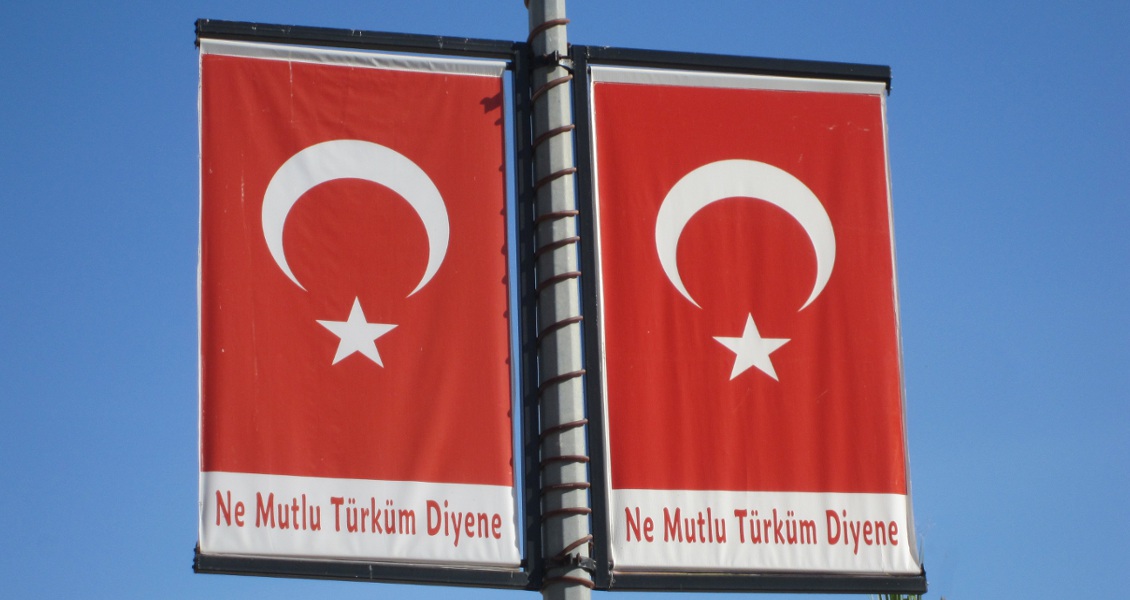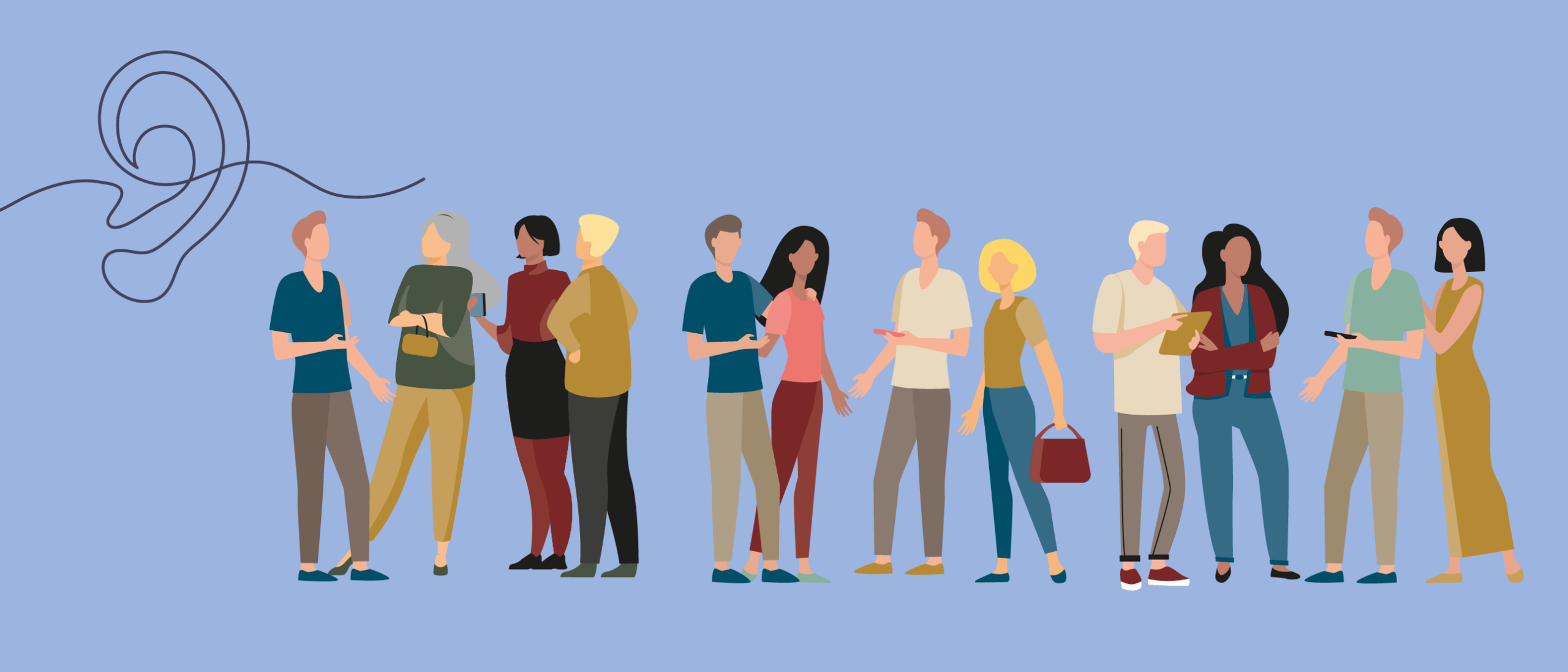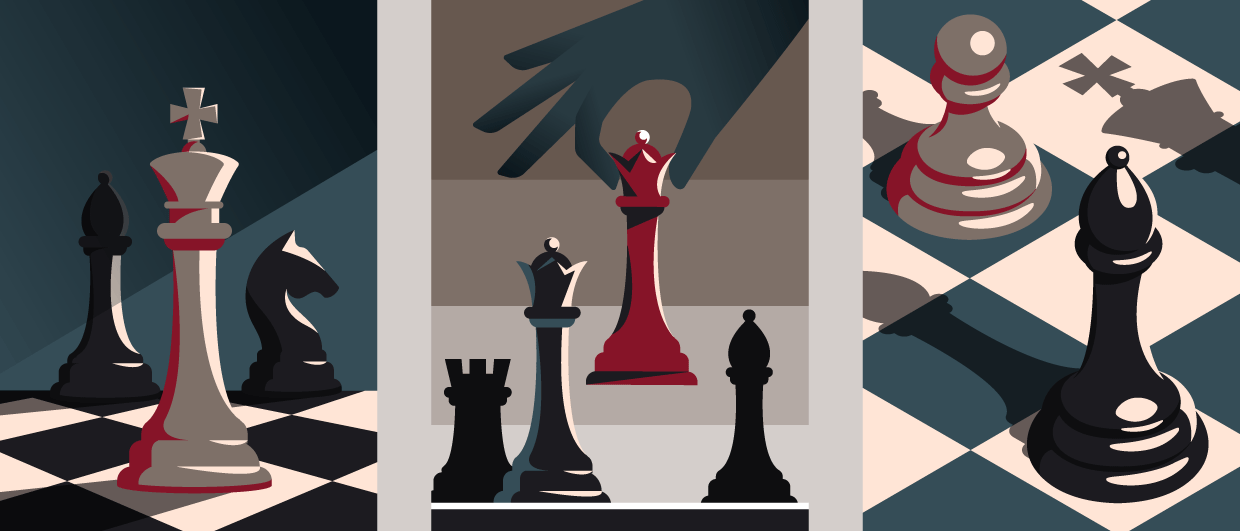Everything appeared to be going so well. In power since his landslide victory in 2002, Recep Tayyip Erdoğan has overseen a political and economic transformation. Military coups and unstable coalitions have been relegated to the past and there has been relative harmony as the government has engaged in a nine-year peace process with Kurdish insurgents, the PKK.
Living standards have improved from a low base as GDP growth has fluctuated around a healthy three per cent. Rapid industrialisation has been accompanied by a construction boom that has transformed most cities.
Energy Transit
Acting as an energy transit route for the West has been a significant part of Turkey’s economic and strategic policy. Turkey has always controlled the Bosphorus choke point, which now carries almost 3 MMbopd, but over the last ten years it has developed its transit status further with a network of pipelines. Most critical are the Kirkuk- Ceyhan and Baku-Tiblisi-Ceyhan (BTC) pipelines that bring Caspian and Iraqi oil to the world’s shipping lanes: they allow Turkey to earn substantial transit fees and have brought growth and revenues to state-owned companies TPAO and BOTAS.
In 2006 the South Caucasus gas pipeline (SCP) was opened, bringing Shah Deniz gas to both Turkey and Georgia. There have been protracted negotiations to extend the SCP to Turkey’s western border, to secure direct transit through Turkey to Eastern and Central Europe. A technical feasibility study for the Trans Anatolian Gas Pipeline (TANAP) was concluded in 2012 and the project is expected to be complete by 2019. Agreement on the pipeline has been cemented by the EU putting its weight behind the Trans Adriatic Pipeline (TAP) which will link with TANAP, taking gas from the Dardanelles through Greece and Albania, and under-sea to Italy.
Thus Turkey has become a key component in Europe’s energy strategy – offering the possibility of reduced dependence on Russian gas (approximately 30% of all European consumption and almost 100% in Eastern Europe), or at the very least increasing countries’ bargaining power vis-à-vis Gazprom. Events in Ukraine have helped focus Western leaders on this objective.
Increasingly Putin-like
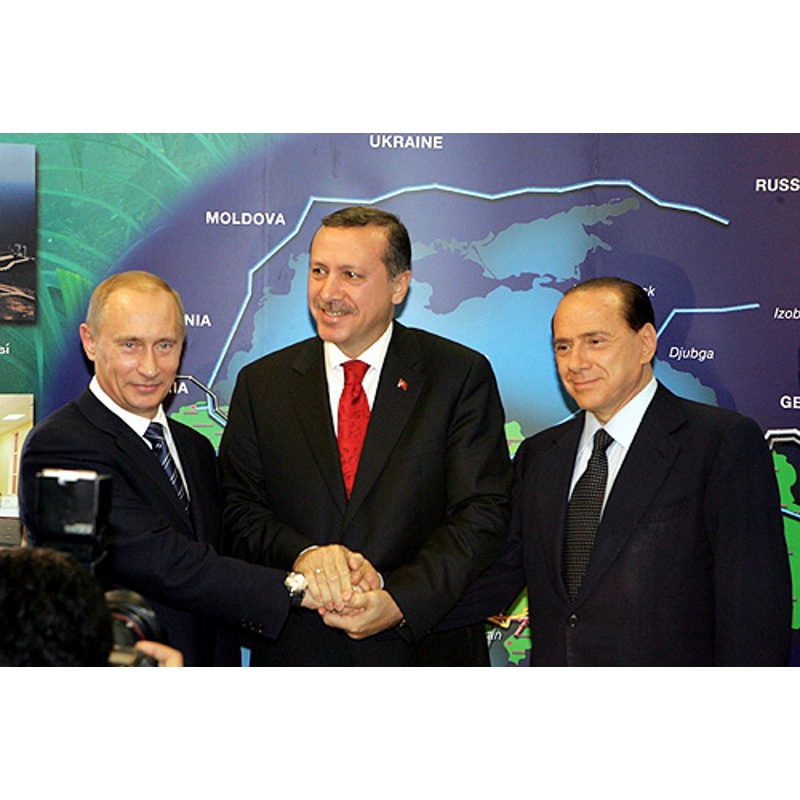 Vladimir Putin, Erdoğan and Silvio Berlusconi at the opening of the Blue Stream gas pipeline in November 2005. In December last year Erdoğan and Putin announced a further extension of the planned pipeline, bringing Russian gas to Europe via Turkey. (Source: Kremlin.ru/Wikipedia)But it appears to be all going wrong. Since 2008 Erdoğan has been showing alarming Putin-like authoritarianism. In 2005 the West turned a blind eye to a new law making it a criminal offence to insult the Turkish nation, but in recent years it has become impossible to ignore the increased attempts to stifle free speech, including moves to outlaw YouTube and Twitter. The protests at Gezi Park in 2013 focused the world’s attention on Erdoğan’s heavy-handed repression of dissent and in December 2014, there were raids of newspaper offices and high-profile detentions.
Vladimir Putin, Erdoğan and Silvio Berlusconi at the opening of the Blue Stream gas pipeline in November 2005. In December last year Erdoğan and Putin announced a further extension of the planned pipeline, bringing Russian gas to Europe via Turkey. (Source: Kremlin.ru/Wikipedia)But it appears to be all going wrong. Since 2008 Erdoğan has been showing alarming Putin-like authoritarianism. In 2005 the West turned a blind eye to a new law making it a criminal offence to insult the Turkish nation, but in recent years it has become impossible to ignore the increased attempts to stifle free speech, including moves to outlaw YouTube and Twitter. The protests at Gezi Park in 2013 focused the world’s attention on Erdoğan’s heavy-handed repression of dissent and in December 2014, there were raids of newspaper offices and high-profile detentions.
The public criticisms of Erdoğan have been fuelled by his attempts to manipulate the constitution in order to move from the role of Prime Minister to an enhanced Presidential role, the dropping of corruption charges against close ministers and their children, and the building of a $615m 1,000-roomed palace – plus a planned 250-roomed presidential suite.
At heart there lies an internal battle between Erdoğan and his former close confidant, Abdullah Gϋl, who in turn is supported by the ‘civil Islam’ group led by exiled Fetullah Gϋlen. Having jointly seen off the final military challenge in 2007, the divisions between the two Islamic traditions have emerged. In very general terms, the Gϋlenists are a centrist social movement, pro EU membership, economic modernisation and freedom of religion, opposed to active involvement in politics and particularly opposed to Iranian-style theocracy. Gϋlenist political activity is largely passive support for moderate opposition parties. However, with their focus on schools, media and business, Erdoğan now sees a ‘parallel state’ that threatens his overthrow.
In contrast, Erdoğan is becoming increasingly Islamist and anti-West. State-run religious schools have increased in number to almost a million, and Erdoğan has called for the re-introduction of the Ottoman script, a direct challenge to the legacy of the state’s founder, Atatϋrk. He has called for women to return to traditional roles and have at least four children, for abortion to be outlawed and for the death penalty to be reintroduced. Erdoğan has recently stated that Muslims discovered America before Christians. He is widely seen as authoritarian, arrogant, and increasingly inept.
A Reliable Ally?
Given Europe’s dependence on Turkey as a transit route and key ally, Western leaders must be wondering whether they are in bed with another Putin. Although not an expansionist state, Turkey’s stability and reliable-supplier status are in question.
The critical division with the West – and with Turkey’s own Kurdish population – is the war with ISIL in northern Iraq and Syria. Erdoğan’s reluctance to get involved has led to a widespread perception that Turkey is prepared to see Kurds massacred – Turkish troops at first stayed passive while ISIL surrounded the Syrian border town of Kobani, within sight of the Turkish border, and the passage of Iraqi Kurdish fighters through Turkish territory was initially refused. This led to widespread demonstrations last October that left 31 people dead.
Similarly, the West has accused Erdoğan of doing nothing to stop the flow of jihadists crossing the Turkish border to join ISIL, many of them coming from Europe. The government has responded with strong criticism of European states.
For Erdoğan, ISIL dominates the anti-Assad forces and therefore is a potential ally in the bid to bring down Syria’s president, Turkey’s number one enemy. The last thing Erdoğan wants to see is a Syrian Kurdish autonomous zone, similar to that in northern Iraq, which will only exacerbate Turkish Kurds’ demands for similar status. Arming the Syrian Kurds’ militia, the PYD, will effectively re-arm Turkey’s PKK, according to Erdoğan. He is reported to have made highly inflammatory statements that there is no difference between the PKK and ISIL.
Turkey argues that the West and Middle Eastern countries’ concern for Syria should be translated into more support for the 1.6m refugees that Turkey has been forced to absorb, largely unaided.
The big question for the West is where this leaves the peace process and how restive the Kurdish population (15–25% of Turkey’s 75 million) will be. Abdullah Öcalan, their leader imprisoned on an island in the Straits of Marmara since 1999, has called for calm. Indeed, to a Western observer, the demands for civil and language rights and a confederalist constitution (not separatism) have always appeared moderate – even if PKK violence has not. It is noteworthy that the Gϋlenists have always opposed the peace process, preferring a unitary state.
New Project With Russia
Adding to the confusion in the relationship between the West and Turkey, a new complication arose late 2014. In December, Erdoğan and Putin jointly announced that Blue Stream, which has brought Russian gas across the Black Sea to Ankara since 2003, is to be extended to a planned new distribution hub at the Greek border. If it goes ahead, Blue Stream will bring an extra 1.73 Tcf of Russian gas to Europe annually, plus another 494 Bcfg specifically for Turkey – all bypassing Ukraine.
Since Europe has, for political reasons, recently scuppered Russia’s plans for a direct pipeline to Bulgaria, known as South Stream, it is unclear why it should look favourably on a route that achieves the same goal but now includes Turkey as a transit state. It is possible that Blue Stream’s extension will bring Turkey into direct conflict with the EU; moreover, the prospect of a closer relationship between Putin and Erdoğan will be sounding alarm bells in Brussels and Washington.
The Future
Having pursued a successful ‘good neighbour’ foreign policy in its early years, Turkey now appears to be at logger-heads with most of its neighbours. Despite Erdoğan’s willingness to do deals with Putin, they remain divided over Syria, the treatment of Crimean Tatars and Russia’s support for Greek Cyprus (where most of Russia’s wealthy bank). Iraq, Syria and Egypt are in turmoil; relations with Israel were downgraded in 2010 following the massacre of Turks on a Gazan food convoy; and Europe has strongly criticised Turkey’s 2014 surveys of Cypriot waters as both illegal and provocative.
At home, Erdoğan appears increasingly embattled, and peace with the Kurdish population appears to have become a more distant prospect. The economic miracle has slowed and the IMF is warning that $200bn of investment is needed to sustain current levels.
Critically for the West, Turkey’s role as a transit state could be at risk. In the past, the PKK has targeted pipelines, frequently the Kirkuk-Ceyhan line and possibly BTC in 2008, when over 30,000 barrels were spilled and a fire burned for a week.
2015 is likely to be an uncomfortable year for Turkey, particularly since it is the centenary of the controversial Armenian ‘genocide’, an anniversary that is likely to stir up more animosity with neighbours and allies. Tensions run deep within Turkish society across many fault-lines. With an educated and generally West-looking majority, Turkey will remain an ally – but it looks like a rocky road ahead.

